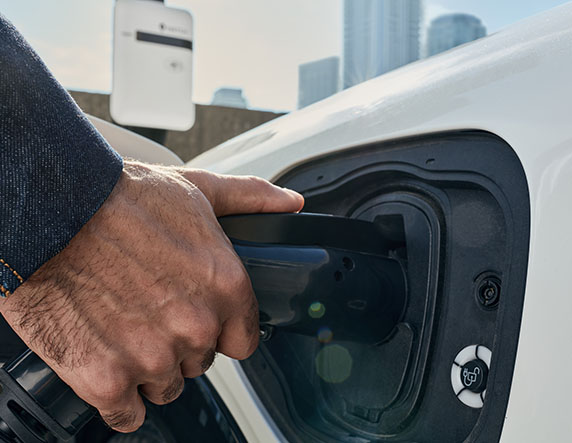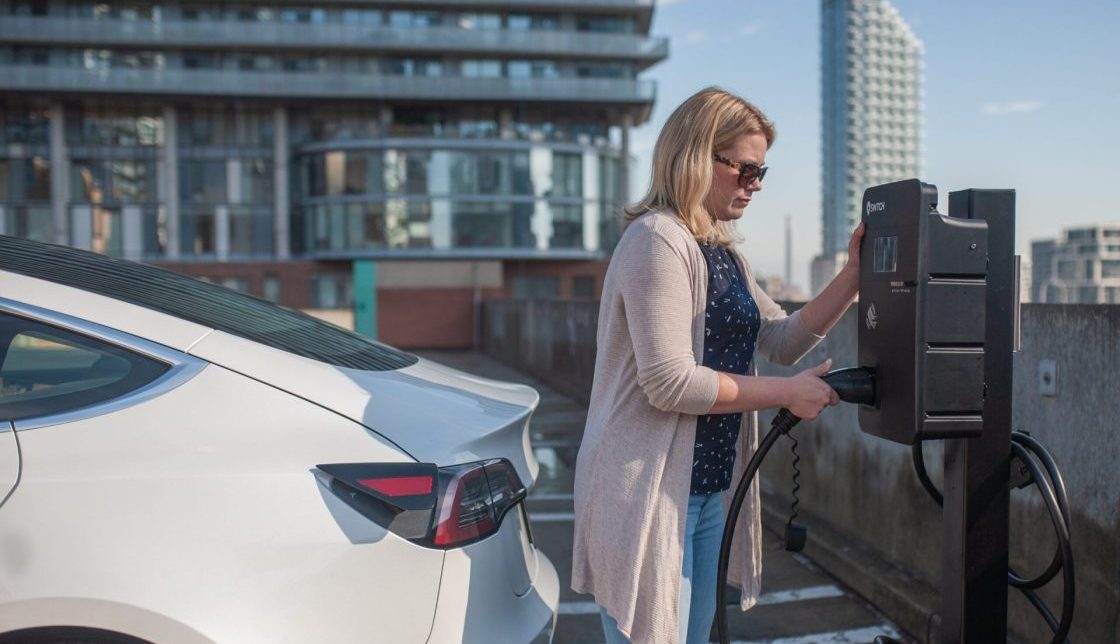How to secure EV charger funding through the Charging and Fueling Infrastructure (CFI) Program
The Charging and Fueling Infrastructure (CFI) program represents a significant opportunity for organizations to install and maintain electric vehicle (EV) charging stations across the United States, with $2.5 billion in funding available.
Want to secure some of this funding for your EV charging projects? Now is the time to act. Here’s everything you need to know about the program and how SWTCH can help you apply for funding today.
What is the CFI program, and what funding does it offer?
The U.S. Department of Transportation’s Federal Highway Administration (FHWA) established the Charging and Fueling Infrastructure (CFI) Discretionary Grant Program to accelerate the deployment of EV charging and alternative fuel infrastructure across the country. The program offers two distinct funding opportunities:
- Community Program: Focused on publicly accessible charging infrastructure in urban and rural communities.
- Corridor Program: Created Aimed to at strategically deploy charging and alternative fueling infrastructure along designated Alternative Fuel Corridors (AFCs).
The CFI program will provide $2.5 billion in competitive grants over five years (fiscal years 2022-2026).
Funding amounts and eligibility
The CFI program offers varying levels of funding based on project type and applicant status:
The Community Program covers:
- Up to 80% of total project costs for most applicants
- Up to 100% of total project costs for certain projects benefiting disadvantaged communities
And the Corridor Program covers:
- Up to 80% of total project costs for most applicants
- Up to 100% of total project costs for projects on tribal lands
There are also minimum and maximum award amounts:
- Minimum award: $500,000
- Maximum award: $15 million
Eligible applicants include:
- Public and state higher education institutions
- Special district governments
- City or township governments
- Native American tribal governments
- County governments
- Select other institutions (see here)
Not eligible for CFI funding? Click here to learn how SWTCH can help you claim accelerated funding through the 30C Tax Credit program.
OCPP, ISO 15118, and other important technical requirements
To ensure interoperability, reliability, and future-proofing of the charging infrastructure, the CFI program has established specific technical requirements for funded projects.
Understanding and meeting these requirements is crucial for a successful application and project implementation.
Here are a couple of the most important ones to know.
OCPP 2.0.1 compliance & support for ISO 15118
All chargers and charging management software selected for CFI-funded projects must support the Open Charge Point Protocol (OCPP) version 2.0.1 (or, someday, higher), as well as the ISO 15118 communication protocol.
OCPP is an open standard that enables communication between EV charging stations and a central management system. This requirement helps ensure:
- Interoperability between different charging station brands and management systems
- Enhanced capabilities for remote management and monitoring
- Future-proofing of the charging infrastructure
And ISO 15118 is the international standard for vehicle-to-grid communication. This standard enables:
- Plug and Charge functionality, allowing for seamless authentication and billing
- Smart charging capabilities
- Future readiness for bidirectional charging and vehicle-to-grid (V2G) applications
To ensure your project is eligible for funding through CFI, you’ll need to partner with a solutions provider that meets both of these criteria, such as SWTCH.
Learn more about SWTCH’s OCPP 2.0.1 certification.
Cybersecurity Measures
Charging infrastructure must incorporate robust cybersecurity features to protect against potential threats, including:
- Secure communication protocols
- Regular security updates
- Compliance with relevant cybersecurity standards
To find an appropriate solution, you’ll therefore need to investigate options that boast security certifications such as SOC II.
The goal is that by making these criteria mandatory (with other technical criteria), CFI hopes to ensure the chargers it helps deploy are secure, robust, and able to contribute to an era of open and smart charging for all.
Why it’s crucial to act now and claim funding through CFI
The transition to electric vehicles is accelerating rapidly, and the demand for charging infrastructure is expected to grow dramatically as more EVs hit the roads.
Applications for the second round of funding, comprising a pool of $800 million in funding, must be submitted by midnight of August 28, 2024.
Here’s why securing CFI funding as soon as you can is so important:
- Limited funding availability: Though the funding pool for CFI is substantial, there’s sure to be a lot of competition to secure funds. The earlier you can apply, the better your chances of receiving funding before the pool runs dry.
- Early mover advantage: Installing charging infrastructure now positions you as a leader in sustainable transportation, which can help you draw in people who prioritize sustainability in their own lives.
- Future-proofing: As EV adoption increases, having charging infrastructure in place will become increasingly important for property values and attractiveness to potential buyers or renters in your region.
- Cost savings: The substantial funding offered by the CFI program significantly reduces the financial burden of installing and maintaining EV charging infrastructure.
Securing CFI funding: A step-by-step guide
While the specific details of your project may vary, the general process for applying for CFI funding is pretty consistent:
- Review program requirements: Carefully read through the Notice of Funding Opportunity (NOFO) to ensure your project meets all eligibility criteria.
- Develop your project plan: Create a comprehensive plan detailing your proposed charging infrastructure, including locations, equipment specifications, and implementation timeline.
- Gather supporting documentation: Collect all necessary documents, such as proof of site control, utility coordination letters, and cost estimates.
- Complete the application: Fill out the CFI program application, ensuring all required information and attachments are included.
- Submit your application: Submit your completed application package through the designated online portal before the deadline.
- Application review: The FHWA will review all submitted applications based on the selection criteria outlined in the NOFO.
- Award notification: If selected, you will receive a notice of award detailing the funding amount and any conditions attached to the grant.
- Grant agreement: Upon acceptance of the award, you will enter into a grant agreement with the FHWA, outlining the terms and conditions of the funding.
- Project implementation: Begin implementing your project according to the approved timeline and budget.
- Reporting and compliance: Throughout the project, you will be required to submit regular reports and comply with all program requirements.
Key considerations for a successful CFI application
In order to secure as much funding through CFI as possible, it’s important to not only meet the basic criteria but also to ensure your project conveys its importance as clearly and completely as possible.
Here are some of the details to pay special attention to:
- Select a strategic location: Choose locations that align with the program’s goals of improving charging access in underserved areas or along key transportation corridors.
- Highlight community impact: Demonstrate how your project will benefit the local community, particularly disadvantaged or rural areas.
- Showcase technological advantages: Highlight any innovative technologies or approaches your project will employ to enhance the charging experience or improve efficiency.
- Talk about local partnerships: If you can establish and highlight strong partnerships with local stakeholders, utilities, and other relevant organizations, it can help you secure funding.
- Discuss long-term plans for operation: Present a clear plan for the ongoing operation and maintenance of the charging infrastructure beyond the grant period. The program wants to ensure that the money it spends will benefit the community for years to come.
- Highlight the environmental benefits: Quantify the expected reduction in greenhouse gas emissions and other environmental benefits resulting from your project. The bigger the impact, the better for your application.
- Explain how your project contributes to equity: As with many funding programs, the CFI program aims to improve equitable distribution of EV charging infrastructure. For best odds of funding, be sure to highlight how your project does so.
- Showcase the cost-effectiveness of your project: The better the per-dollar benefit your project can deliver, the better your odds of securing funding. Be sure to present your project as maximizing the impact of CFI’s funding.
How SWTCH can help you secure funding through CFI
Our team at SWTCH has helped dozens of organizations across North America to secure funding from all kinds of programs at the state and federal levels, and we’ll be happy to do the same for you.
Get in touch with us to see how our platform meets (and exceeds) the technical requirements in place with CFI, as well as for expert guidance on how best to position your project for a successful application.
Final advice
The Charging and Fueling Infrastructure (CFI) program presents a unique opportunity to secure substantial funding for EV charging infrastructure. By acting now and submitting a well-crafted application, you can position your organization at the forefront of the electric vehicle revolution while benefiting from significant cost savings.
Remember, the transition to electric vehicles is happening rapidly, and having accessible charging infrastructure will soon become a necessity rather than a luxury. Don’t miss this chance to secure CFI funding and contribute to a cleaner, more sustainable transportation future.
Ready to secure your CFI funding?
Reach out to our team for a consultation today!






